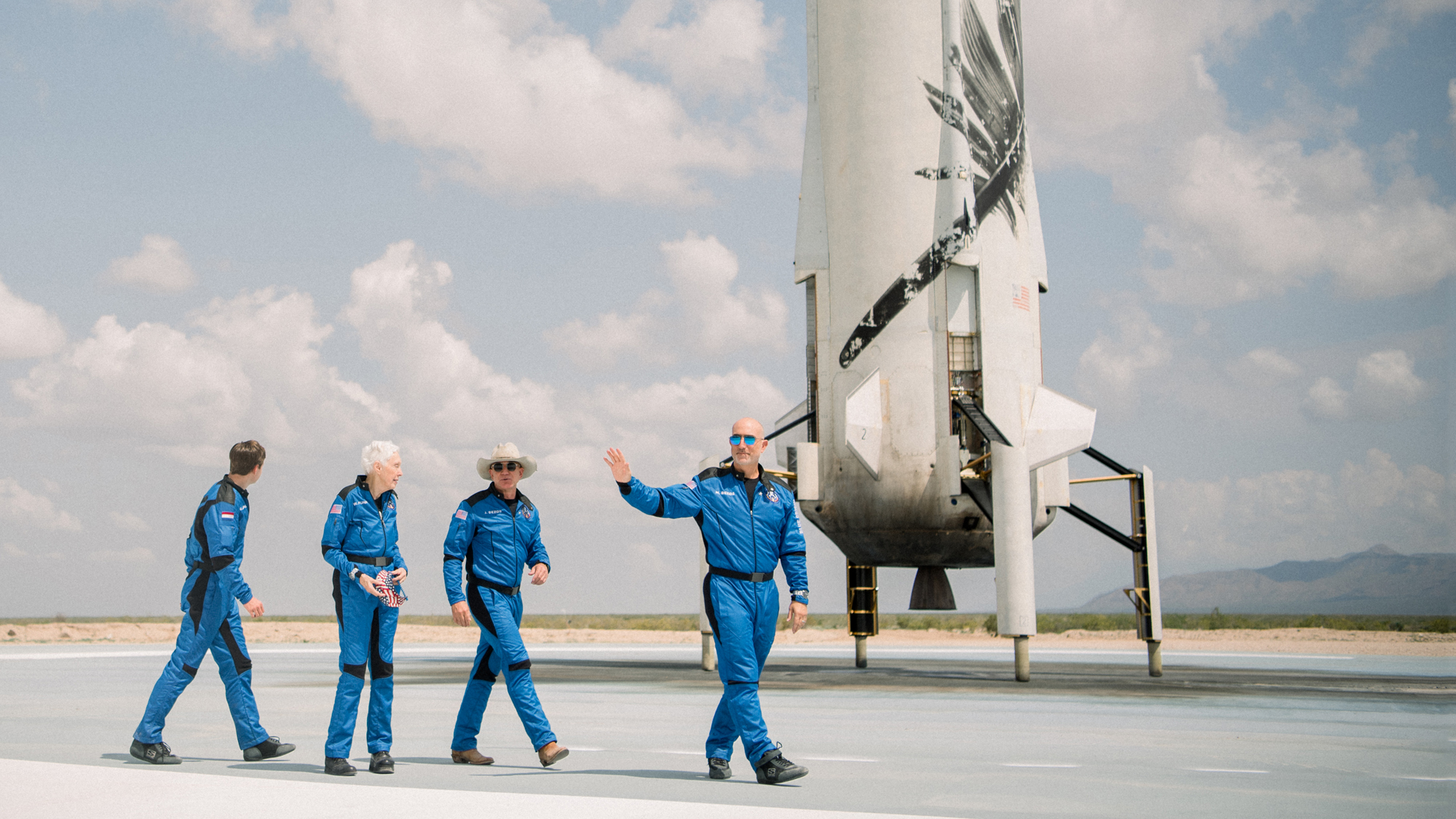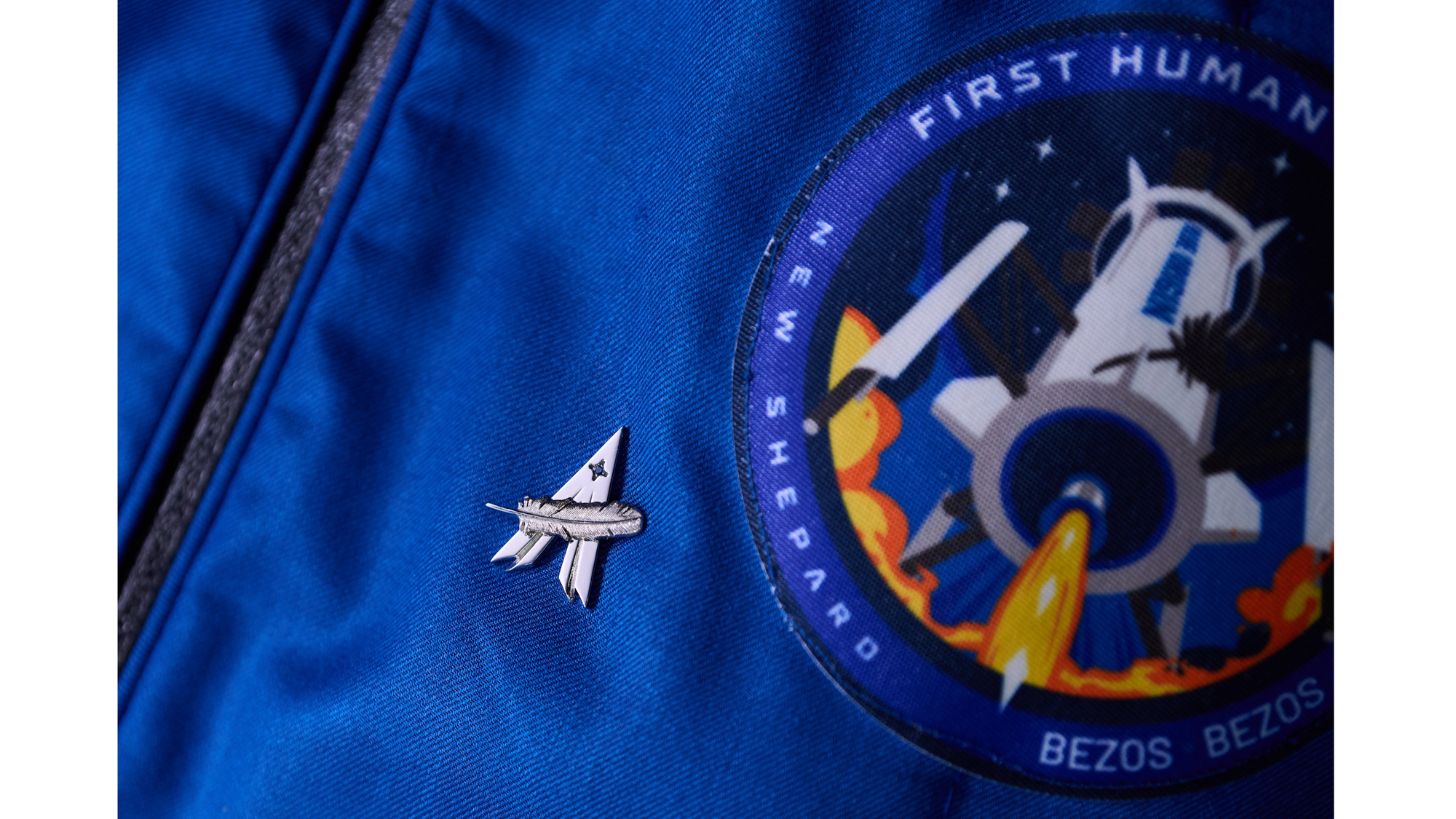New FAA rules change who qualifies for commercial astronaut wings

The Federal Aviation Administration (FAA) has changed their qualifications for commercial astronaut wings, and Blue Origin's first flight crew might no longer be eligible. That, however, doesn't change whether or not they are astronauts.
Recently, two crews from the space tourism companies Virgin Galactic and Blue Origin launched their first fully crewed suborbital test flights on SpaceShipTwo and New Shepard vehicles, respectively, each reaching different boundaries of space.
Virgin Galactic's space plane surpassed a 50-mile (80 kilometers) altitude and Blue Origin's capsule reached 62 miles (100 km) above Earth's surface, a boundary known as the Kármán line. However, while both missions passed these thresholds, it is possible that not everyone on these flights will earn official commercial astronaut wings with the FAA.
Related: How to become an astronaut
On July 20, the same day that Blue Origin launched its crewed suborbital mission using the New Shepard vehicle, the FAA announced a major change to its Commercial Space Astronaut Wings Program, which launched in 2004. Previously, to be eligible to earn the wings, commercial launch crew members had to both meet specific requirements for flight crew qualifications and training and fly above a 50-mile (80 km) altitude on an FAA-licensed or permitted vehicle.
Now, effective July 20, the FAA has added new criteria to its short list of qualifications.
With the new change, those who fly on commercial space missions must also have "demonstrated activities during flight that were essential to public safety, or contributed to human space flight safety," according to the FAA.
Breaking space news, the latest updates on rocket launches, skywatching events and more!
Related: Jeff Bezos launches into space on Blue Origin's 1st astronaut flight
In addition to this change to the qualifications, the FAA also added that it can award "honorary" commercial space astronaut wings "to individuals who demonstrated extraordinary contribution or beneficial service to the commercial human spaceflight industry." The FAA adds that "these individuals receiving an honorary award may not be required to satisfy all eligibility requirements. The award can be granted posthumously."
The FAA also states in its policy that "in order to maintain the prestige of Commercial Space Astronaut Wings, the FAA may further refine the eligibility requirements at any time as it deems appropriate."
With these changes in place, people have wondered whether these new commercial flyers will receive wings. Currently, it appears as though the Virgin Galactic crew, having flown the Unity 22 test flight and meeting flight crew qualifications, may be eligible for these commercial wings. However, it is not yet clear whether or not the Blue Origin crew, which included founder Jeff Bezos and famed aviator Wally Funk, will earn these wings.
Related: 'Welcome to the dawn of a new space age,' Branson says
What makes an astronaut?
Regardless of whether these crewmembers will receive the FAA's "official" commercial space astronaut wings, the space flyers may still be awarded honorary wings. It is not yet clear if the honorary FAA wings are different in appearance or carry any additional meaning.
Additionally, whether or not someone has FAA wings does not determine whether or not they are considered astronauts.
According to the dictionary Merriam-Webster, an astronaut is defined as "a person who travels beyond the earth's atmosphere," or "a trainee for spaceflight."
In the U.S., the FAA and the U.S. military awards astronaut wings to those who fly above 50 miles (80 km). However, NASA astronauts don't receive wings to qualify their astronaut status. Since the dawn of human spaceflight, "wings" have not been a necessary requirement to achieve astronaut status.
Email Chelsea Gohd at cgohd@space.com or follow her on Twitter @chelsea_gohd. Follow us on Twitter @Spacedotcom and on Facebook.

Chelsea “Foxanne” Gohd joined Space.com in 2018 and is now a Senior Writer, writing about everything from climate change to planetary science and human spaceflight in both articles and on-camera in videos. With a degree in Public Health and biological sciences, Chelsea has written and worked for institutions including the American Museum of Natural History, Scientific American, Discover Magazine Blog, Astronomy Magazine and Live Science. When not writing, editing or filming something space-y, Chelsea "Foxanne" Gohd is writing music and performing as Foxanne, even launching a song to space in 2021 with Inspiration4. You can follow her on Twitter @chelsea_gohd and @foxannemusic.

